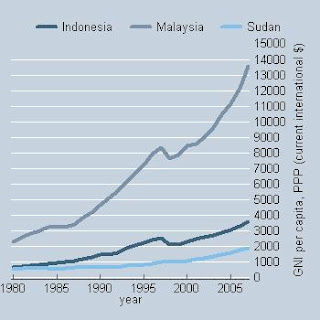Tuesday, February 24, 2009
Video commentary on ICC trials
http://bloggingheads.tv/diavlogs/17898?in=28:58&out=34:51
Friday, February 20, 2009
Cherry Leonardi's paper on chiefship in Yei
So suppose someone asked the question, "Say I was going to an UNMIS project manager in the Yei area. What do I need to know?" At one level the response might be something like, you need to know the personalities and histories and identifications of the people involved. i.e. go read the "personnel files"... the British colonial authorities (and French, in their colonies) would keep on everyone- once a year. "A lazy thief." "Clever and cares about his people." "Worked with Slatin. Not to be trusted."
But Leonardi does more than that. She takes the local politics and personalities of chiefship in Yei to make a very general statement about one of the biggest and thorniest issues in African studies: What is the "constitutional" place of this office called chief? She shows the enduring power of a whole set of discourses brought to bear on the subject; and none of these discourses deal with democracy, checks and balances, merit, justice, etc. That is, the vocabulary of constitutional order based on the sovereignty of the people is absent when dealing with chiefship, much as it is absent when thinking about the priesthood in Catholicism. Tremendously important, because priests now content themselves to be counsellors, while chiefs continue to be rulers. Why would these discourses of democracy be so unresonant? Because the instituions that deploy these discourses, in the context of Sudan, do precisely the opposite in practice. They (states, rebel armies, freedom fighters) do not acknowledge the soveregnty of the people, instead they abuse, violently, the people they ostensibly claim to serve. They use- as means- people, to accomplish ends.
Wednesday, February 18, 2009
Recent overview of the situation in Darfur
Monday, February 16, 2009
Mode of liability applied to al-Bashir
From Kevin Jon Heller of Opinio Juris:
Finally, it is important to point out that even if Article 25(3)(d) did embrace JCE III, it would still not be an appropriate vehicle for convicting Bashir of genocide: “contribution” is a form of accessory liability, not prinicipal liability — and a “residual” form of accessory liability at that, one that most ICL scholars agree should only be invoked where principal liability or liability for aiding-and-abetting cannot be proven. “Contribution” liability may thus be appropriate for lower-level government officials like Kushayb and Haroun, but it is not appropriate for a head-of-state such as Bashir, who needs to be charged as a principal.
The Prosecutor, of course, recognizes this. That is why the request for the arrest warrant relies on perpetration by means, which is a form of principal liability, and not on “contribution.” As I will explain in a later post, that was the correct decision: perpetration by means — not JCE III — provides the Prosecutor with the ideal vehicle for convicting Bashir of genocide.
Friday, February 13, 2009
So what *was* up with that fakeout leak at the ICC???
ICC Definitely, Probably, Maybe, or Possibly Not About to Issue Bashir Warrant
Kind of a crazy day, huh?
First the New York Times reports this morning that the Pre-Trial Chamber of the ICC has decided to go ahead and approve Chief Prosecutor Luis Moreno-Ocampo's request for a warrant for President Omar Hassan al-Bashir of Sudan. Then hours later the ICC responds with a tersely worded statement to the effect of "Nuh-uh."
This is either hella embarrassing or kind of a mean trick to play on all those media organizations chomping at the bit to bust out some portentous headlines about the first head of state to be indicted by the International Criminal Court. Michelle at Stop Genocide speculates that it might be the latter:
"[B]y leaking the information in the days before the announcement, and then issuing an obligatory denial, someone out there might be trying to soften the blow, test the waters, or at least give a warning to the international community that this is finally coming."
Word on the street (by which I mean the actual streets of the Hague, where international justice rumors flow fast and hot like so much raw sewage) suggests that this may not be far off the mark. The general consensus seems to be that the only question left unsettled is when, not whether, the arrest warrant will be issued.
Thursday, February 12, 2009
Arrest warrant issued, it seems
Saturday, February 7, 2009
Lundin Oil leaving Sudan
Friday, February 6, 2009
Sudan's Income per capita over time in comparative perspective
Justice en route?
Since the ICC is so new, there is very little precedent for what kinds of evidence will convince the judges of al-Bashir's guilt on the various charges. Different scenarios are possible, from top regime officials turning against al-Bashir and offering testimony against him, to a "wall of silence" and victim and accomplice intimidation.
Some commentators have been positioning themselves as doomsayers, arguing that any violence from here on can be attributed to the arrest warrant, but the fact is that Darfur, and the tense North-South relationship, are boiling cauldrons that could bubble over at any time.
But the arrest warrant, if indeed issued, will dramatically change the power game in Khartoum. This is now the time for civilian activists around the world to be watchful, and always ready to argue that the ICC is an international institution of justice for the most heinous crimes, and therefore we all have an interest in persuading people to respect its authority, if we aspire to have some international mechanism of accountability. In some sense, a not-bad outcome would be for al-Bashir to stand trial and be found not guilty of many of the charges, with the judges in the process setting some evidentiary standards. The very fact of a trial will be an enormous deterrent to future wanton acts of violence by illegitimate regimes, rather than a license to violence. In my opinion (this is not evidence-based interpretation).

